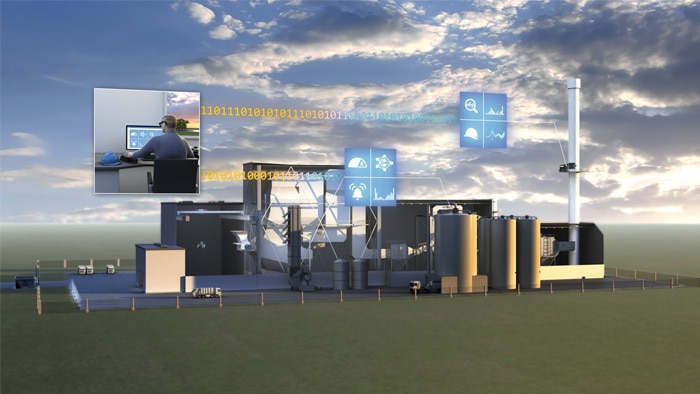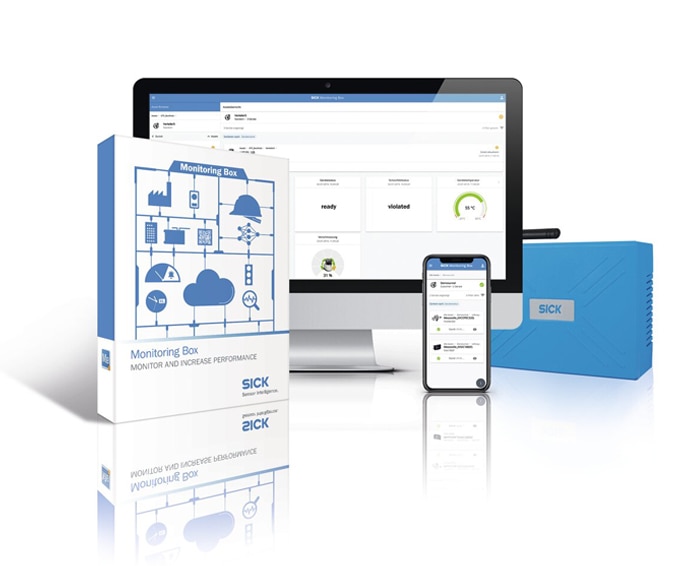Smart Data Solutions from SICK show their strengths in a wide range of different industries. For example, a large European energy supplier uses condition monitoring for gas analyzers in waste incineration. As a result, the company was able to significantly increase the availability of its plant, better plan maintenance work in advance as well as reduce maintenance costs.
Condition monitoring in energy supply: Answers from the future
The most important things in life often seem quite matter-of-fact. Electricity, water and heat are such a part of our everyday lives that we only notice them when they’re gone. It is energy suppliers who ensure that we have a consistently high quality of life. When it comes to electricity and heat, modern waste incineration plants generate these with low CO2 emissions when prevention and recycling of waste are no longer enough.
Thermal waste utilization: Gas analyzers for environmentally-friendly energy production
The pollutants produced during combustion are filtered out with a complex gas cleaning system. An energy supplier active throughout Europe monitors its emissions with gas analyzers from SICK in order to safely comply with the official requirements for emission control. With “extractive measurement technology”, a partial gas stream is taken from the exhaust gas and fed into the analyzer, which measures substances such as nitrogen oxides, carbon monoxide and mercury with precision down to microgram concentrations per cubic meter.
The aim is to minimize downtime, because legislators in different countries impose strict emission requirements before approving a plant. For example, if the emission measurement system fails, the operator is threatened with large fines, or officials could even shut down the plant. This makes high availability of analysis equipment even more important.
Regular maintenance work ensures availability of the analyzers and therefore the emission measurement system. SICK monitors the individual device components and operating parameters and replaces the corresponding parts in time. This makes it possible to comply with the statutory measures for air pollution control, and with 97% emission measurement availability.
The Monitoring Box increases plant availability
To help both the user and the service provider plan maintenance in a more targeted manner and react even better to potential failures, the energy supplier uses a predictive maintenance solution from SICK to supplement its routine inspections, which are very time-sensitive. This digital service identifies critical condition changes quickly and proactively. This means service technicians can arrive on time and with the right spare parts. In many cases, the cause can be diagnosed remotely and the problem solved immediately before the plant would have to be shut down.
This is why the operating entity relies on a web-based condition monitoring solution from SICK. The physical Monitoring Box itself is a TDC (Telematic Data Collector) gateway system with an application-specific software package for the browser application. The vital data collected by the gateway from the analyzers is encrypted and sent to the cloud for processing via cell phone, LAN or WLAN. This allows important changes in the device condition to be visualized using device-specific monitoring apps. On the dashboard, the service employee at the energy supplier can monitor the condition of the gas analyzer and its functions in real time or trace them back in the history. If predefined limit values are exceeded, an e-mail with this information is automatically sent out. Field service experts can also proactively provide concrete recommendations for action as part of the SICK Monitoring Services.
Condition monitoring meets forecasts from data analyses
Such an innovative solution required a highly customized approach in the development phase. In a 6-month pilot phase for data analysis, SICK used the Monitoring Box to collect device condition data from the analyzers in order to adapt the solution to the application. Using up to several thousand variables, the most important values for condition monitoring and data analysis were defined. The data was clearly arranged, combined and put in a relevant context. Based on these findings, the Smart Data Solutions team from SICK developed a suitable predictive maintenance model for the condition of the most sensitive component groups. The result: A large number of malfunctions were predicted with high precision. For example, enhanced component aging and increased wear on consumable parts were detected in advance.
Another “side-effect” is that the ongoing data analyses make it possible to continue to develop the Monitoring Box. This results in even more precise predictions with the uptime, and these can be extended to include additional applications. This also increases the availability of the measured values, and significantly reduces plant downtime.






